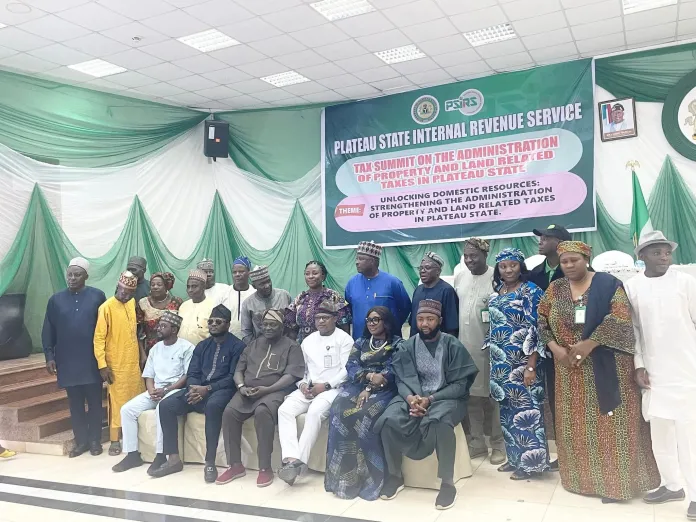Plateau State has taken a bold step toward transforming its internally generated revenue (IGR) system by convening a two-day Tax Summit focused on property and land administration. The summit, which ended on Friday, August 22, 2025, brought together top government officials, legal experts, technocrats, development partners, and community leaders to address long-standing challenges in domestic resource mobilization.
The event, themed “Unlocking Domestic Resources: Strengthening the Administration of Property and Land-Related Taxes in Plateau State,” emphasized the centrality of land as a driver of sustainable revenue.
Governor Caleb Manasseh Mutfwang, represented by the Secretary to the Government, Arch. Samuel N. Jatau, stressed that the summit was about redefining governance and renewing the social contract between the government and citizens.
“Land is one of our greatest assets, yet it remains underutilized in driving development. What we are doing with this summit is to set a new tone—that Plateau must look inward, harness its resources, and build a transparent system of taxation that benefits every citizen. Property and land taxes are not punishments; they are contributions toward building a state we are proud to call home,” he said.
The governor pledged reforms to harmonize land administration, expand the tax net, and enforce fairness. He noted that a transparent and predictable tax regime would inspire citizens’ compliance under the Plateau Project vision.
Data presented at the summit revealed staggering underperformance: though NASA surveys identified over one million buildings across the state, only about 14,000 are currently within the tax net—just 1.4 percent of the total stock.

Dr. Jim Pam Wayas, Executive Chairman of the Plateau State Internal Revenue Service (PSIRS), described the situation as a “medical emergency,” comparing revenue to the lifeblood of government. “Plateau has been operating with just six pints of blood when it could easily have seven or more,” he said.
Legal experts highlighted the need to bridge the gap between statutory land laws and customary tenure systems. Attorney General and Commissioner for Justice, Hon. Philemon Audu Daffi, noted that the challenge was not the absence of laws, but fragmentation in Nigeria’s land administration.
The Plateau Geographic Information Service (PLAGIS), represented by Mr. Sunday Bulus, showcased how digital property mapping and spatial data could automate identification, valuation, billing, and collection. Property owners, he explained, could soon receive tax notices via SMS or email and pay electronically.
“Data has become the new oil. The question is: how do we harness it to generate wealth? That is why we are here,” Dr. Wayas emphasized.
International case studies were also presented, including Sierra Leone’s reforms in property taxation and comparative research in Kaduna, Niger, and Ekiti States that attracted interest from the Gates Foundation.

A key highlight of the summit was the inauguration of an Implementation Committee chaired by the Attorney General. A seven-point action plan was adopted to address:
- Harmonization of land tenure systems.
- Capacity building for local governments.
- Data-driven revenue forecasting.
- Technology integration across agencies.
- Community sensitization.
- Objective property valuation reforms.
- Updates to legal frameworks.
Commissioner for Lands, Survey and Town Planning, Hon. Peter Nyam Gei, assured that the reforms would simplify processes and eliminate harassment. “Once you are given a demand notice and make your payment, that’s it—you are done,” he said.
The second day of the summit examined the performance of Ministries, Departments, and Agencies (MDAs) under the theme “Appraising the Revenue Performance of MDAs and the Way Forward.” Governor Mutfwang was represented by the Commissioner for Transport, Hon. Jatau Davou Gyang.
A five-year review revealed poor performance between 2020 and 2022, with improvements in 2023 when Plateau achieved 102 percent of its revenue target and raised IGR contributions to 34 percent. Performance reached 62 percent in 2024, but mid-year 2025 data showed worrying trends: only 13.4 percent of MDAs had met at least half their targets, 63.4 percent performed below 25 percent, and 17.1 percent recorded no revenue at all.
Top-performing MDAs included the Ministry of Information & Communication (1,243.76%), Ministry of Justice (729.43%), Jos Main Market Authority (428.96%), and Plateau State Scholarship Board (125%). Underperformers included the Ministries of Agriculture, Science and Technology, ICT Development Agency, and Health.
Recommendations put forward included setting realistic targets, diversifying revenue sources, deepening automation, quarterly performance reviews, and rewarding high-performing MDAs.
Summit participants expressed optimism that Plateau’s reforms could serve as a model for other states amid shrinking federal allocations.
“This is not a talk-shop. We are moving beyond rhetoric to action,” one participant declared, as the summit closed with renewed commitment to building a fair, predictable, and transparent taxation system that underpins sustainable governance and development.

